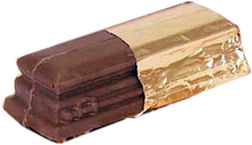Naked Is the New Clothed
 Friday, July 13, 2007 at 05:24PM
Friday, July 13, 2007 at 05:24PM  Quote: “X is the new Y.” Erin O’Connor in the Snowclones Database.
Quote: “X is the new Y.” Erin O’Connor in the Snowclones Database.
Figure of Speech: snowclone (SNO-clone), the retrofitted cliché.
Figaro loves screwing up clichés (see page 213 of his book). His mouth waters at the very thought of the snowclone, which takes a cliché and adapts it to a new purpose. “Have X, will travel” is a snowclone. Remember the stupid “Close encounters of the X kind?” Another snowclone. “X is the new black,” an expression that continues to infect women’s magazines, derives from fashion guru Diana Vreeland who said, cryptically, “Pink is the navy blue of India.”
Thanks to Jeff Sexton for sending us the Snowclones link. The name comes from the hoax that the Eskimos have N words for snow. (Just so you don’t think Figaro makes all this stuff up, the term was first proposed on the blog agoraphilia and promoted on the highly influential Language Log.)
Aristotle would scratch his hoary head and ask how the snowclone differs from his commonplace — received wisdom that counts as a rhetorical axiom in an argument. And we would say to A-man: The commonplace doesn’t change. The snowclone is new and improved.
Or, perhaps, new and abused.
Snappy Answer: “Y thinks X is tacky.”






